Reaching out…
Bringing some prayerful time to the housebound…
Very much a form of ministry…
These are some of the statements from people in our diocese who are involved in making radio programmes.
They all regard what they do as a form of ministry and while this work can be time-consuming, the rewards are rich, they say, and they would encourage anyone who thinks they have an interest in this kind of voluntary work to take the plunge and get involved.
The radio presenters include Canon Barbara Fryday in Clonmel on Tipp Fm 97.1’s Sunday Live at 7-8 a.m., Dean of Cashel Gerald Field on Tipperary MidWest Community Radio Midweek Musings(104.8 FM and 106.7 FM) each Wednesday night at 6.30 p.m. Valeria Power on occasional South East Radio Christian Media Trust programmes (95.6 and 96.4 FM) and Heidi Good and Declan Gibbons who are both involved with Community Radio Kilkenny City (88.7 FM) Spirit Alive programme on Saturday mornings at 10.00 a.m.
Radio was important to varying degrees in all their homes as they grew up and that interest continues to this day with most still listening to ‘talk radio’ news, current affairs and music programmes.
Here is some information about what each of our Diocesan radio stars does, why they do it and a little about how they do it.
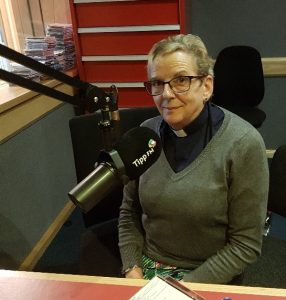 Canon Barbara Fryday, rector of Clonmel Union of Parishes presents a programme called Sunday Life on Tipp FM 97.1 FM once every five weeks.
Canon Barbara Fryday, rector of Clonmel Union of Parishes presents a programme called Sunday Life on Tipp FM 97.1 FM once every five weeks.
Barbara has been doing this work so long that microphones don’t faze her anymore, she says.
Listeners have to be up early to hear her, however, as her pre-recorded programme is broadcast between 7 and 8 a.m.
Barbara got involved in radio back in 1996 when she helped out with programme-making in Kilkenny.
“I got roped in to interview people about all sorts of subjects,” Barbara said. “I had also done a bit of work on Mid-West radio and when I arrived in Clonmel I inherited the Church of Ireland Sunday morning slot.”
Barbara likes radio because it is a medium that keeps listeners ‘in the world’.
“That’s what they tell me. Quite a large group tune in on Sunday morning. Many are still in bed,” she says.
The radio was always on in the house when Barbara was growing up.
“The news was always listened to and I loved listening to grand occasions and visualising what was happening in my head.”
Her hour-long Sunday Life programme once every five weeks includes church calendar topics and spiritual music.
“We have music at the beginning and end of each quarter of the programme and read from scripture – perhaps the readings of the day as well as talk about the theme or choose another topic. Just recently I talked about my journeys, particularly about the religious sites, for example, and about governance of the Church of Ireland ahead of the General Synod.”
The idea is to keep the programme ecumenical, she says. “We are there to bring a small amount of time with the Lord on air for those who find it difficult to share in worship with others.”
Learning to time music and what you say is important when making radio programmes, she says.
“One needs to be quite good at that but it comes with practice. It doesn’t always work to rely on the section-ending hymn to bring you to the ads!”
Feedback from listeners lets her know what type of prayer/songs/hymns they like and she is always aware of those who listen, she adds.
“Even though there are only two of us in the studio I can still focus as if I have lots of invisible people listening. I don’t listen to myself though and find it very funny when somebody meets me while they think I’m in the studio!”
She is involved in radio because she wants to reach out, she says.
“We do it for our listeners, not ourselves. Sunday Life is a part of a lot of peoples’ lives and they look forward to it on Sundays at 7 a.m.”
Barbara gets assistance with sound engineering for the programme from helpful station staff.
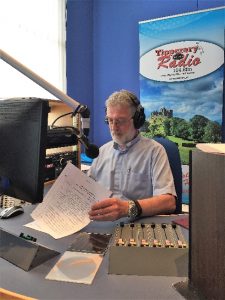 The Very Reverend Gerald Field, Dean of Cashel produces, presents and sound engineers a weekly programme called Midweek Musings on Tipperary MidWest Community Radio (104.8 FM and 106.7 FM). This is broadcast on the first three/four Wednesdays of the month from 6.30 – 7.00 p.m.
The Very Reverend Gerald Field, Dean of Cashel produces, presents and sound engineers a weekly programme called Midweek Musings on Tipperary MidWest Community Radio (104.8 FM and 106.7 FM). This is broadcast on the first three/four Wednesdays of the month from 6.30 – 7.00 p.m.
He believes that this work is a ministry which, like any other form of ministry, requires time and preparation but which brings its rewards.
His work on this programme came with the role of Dean of Cashel.
“It was in the job spec when I arrived,” he says.
Gerald isn’t sure exactly what attracts him to radio as a communications medium.
“It could be the anonymity of just sitting behind a microphone and using only your voice to engage people in whatever environment they may be in whilst listening.”
A fan of BBC Radio 1 and Transworld Radio growing up he listens to a lot of news and religious programmes now including Spirit FM (when he can get it).
Topicality in relation to the church year is also important for him and he will also feature music from new bands/singers.
Midweek Musings contains interviews about all sorts of topics with content gleaned from Soul Waves, the organisation that provides religious programming for use by local radio stations.
“If there is anything that catches my attention on their website list I will download and edit the interview to fit the time I have available in my programme alongside the other items,” he says.
He also interviews people live on air occasionally, by phone or in studio if there is something of local or diocesan interest to highlight.
He enjoys the sound engineering side of things, he says.
Having built up a reasonable amount of technical knowledge over the years he can record and edit interviews at home to take with him to the studio for live broadcast on the night.
“After seeing that I could handle my way round the controls they let me loose!” he says.
Gerald feels that religious programming gets some valued space in Tipperary.
“Locally we do OK but nationally, apart from Sunday Services on RTE I’m not aware of any religious broadcasts that are regular each week. It tends to be seasonal in my experience.”
Working in a voluntary environment has worked out well for him, he says.
“The staff I network with are very good. They appreciate what I’m trying to do and value the service provided by the religious contribution to its programme schedule.”
If you have an interest in radio and want to get involved Gerald has this to say:
“If you’ve any interest at all in being creative in proclaiming the gospel message, radio is a very good medium in which to get involved. You don’t need a vast amount of knowledge of the workings of a studio. There’s usually a sound engineer who will take care of that side of things. The feedback from my short programme alone is reassuring that this is very much a form of ministry, especially to those unable to get out of their homes very much.”
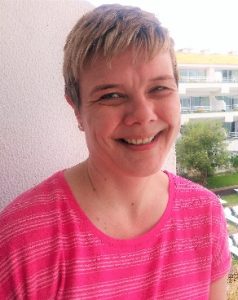 HEIDI GOOD presents Spirit Alive on alternate Saturday mornings at 10.00 a.m. on Community Radio Kilkenny City (88.7 FM). She is also on the Board of Directors.
HEIDI GOOD presents Spirit Alive on alternate Saturday mornings at 10.00 a.m. on Community Radio Kilkenny City (88.7 FM). She is also on the Board of Directors.
She was introduced to radio by Fr Willie Purcell, the other Spirit Alive presenter who was keen that the whole Christian community be involved.
While Heidi was a preacher in the Methodist church for 20 years and was therefore used to public speaking presenting radio programmes is very different, she says.
“That’s because you can’t actually see who you are engaging with. It’s a new challenge but I’m enjoying the learning curve.”
She is also learning to ‘drive’ the programme herself, she says, which makes her feel more part of what she is bringing to her listeners.
Growing up and boarding in Wesley the pirate stations were very important to her.
“Sunshine FM was fantastic and many a song was recorded from radio onto tape during those years!”
Now a member of the Church of Ireland she keeps an eye on the Kilkenny Union newsletter The Loom for news items that would interest her listeners. She also keeps in touch with other ministers in the area and Christians involved in other areas of interest.
“For example, I recently did an interview about the 20th anniversary of the Belfast Agreement. For music and reflections I am often guided by the lectionary and by city or world events.”
But how does Heidi prepare for the programme?
“I think, pray, think, pray and sometimes panic!” she says.
Heidi recently bought a digital recorder so that she could do outside-studio interviews herself. She also now edits those interviews using specialist computer software before including them in her programme.
“A few times I’ve put scripture reading to music too. I’m not an expert by a long shot but I do enjoy the editing process.”
She has some sympathy with the big commercial stations who don’t give time to religious programming, she says.
“If it doesn’t attract enough listeners and therefore inadequate advertising it is simply not commercially viable. The church needs to consider why so many of the population do not want to listen to religious programmes and that brings us back to the mission and the witness of God’s people. I am simply thankful we have this opportunity on a community radio station.”
While finding the time out of a busy life to make programmes can be difficult, listeners are a big motivator, she adds.
“They appreciate the work we do and often give positive feedback.”
Why does she think people should get involved in radio?
“Radio is an opportunity for people with all kinds of gifts and talents. The presenting is only the half of it! Phones need to be tended to, tech skills are always needed and people who are good at maintenance, for example.”
She points out that the support of local churches is hugely important and greatly appreciated especially those willing to come on radio and chat!
“Everyone has a story to tell and it is always wonderful to have the opportunity to let them tell that story.”
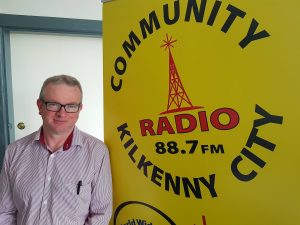 Declan Gibbons is Station Manager at Community Radio Kilkenny City 88.7FM and was always interested in radio, especially news.
Declan Gibbons is Station Manager at Community Radio Kilkenny City 88.7FM and was always interested in radio, especially news.
“A neighbour of mine thought I might be good at radio and suggested I volunteer with Radio Kilkenny,” he says.
“I spent a while doing research and background work before I got my first broadcasting opportunity doing a review of the year around Christmas time. That seemed to go well, and I was asked to do other things, occasionally filling in as a presenter.
I was always keen to do talk radio and probably took on some projects that were too advanced for me at the start but that’s what ambition is for!”
Declan considers radio to be a very intimate medium.
“It’s you and the listener – at least that’s how it should be. There is something very warm about the relationship between a good radio presenter and his/her listeners. There is also a degree of trust, which must be earned by the presenter.”
Declan thinks it’s remarkable how the proportion of spiritual programming has diminished in recent years. “Whether it’s RTE’s religious programmes migrating to long wave (LW) or other stations simply dropping spiritual programming, the landscape is remarkably transformed. Perhaps community radio is helping to fill this void in some areas.”
Declan would encourage people to get involved too.
“It is a very rewarding interest to have. You don’t have to appear on air – though we hope that you will! You learn a lot of real skills. You can also get to share your passion – gardening, religion, music, politics, sport etc – with the wider community. Spirit Alive (Saturday mornings at 10.00 a.m.) is the only religious affairs programme broadcast on FM in our area. It is ecumenical and very popular with our audience.”
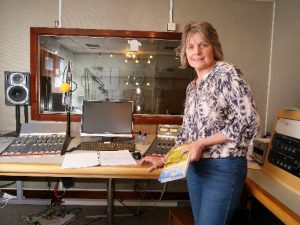 VALERIE POWER makes programmes for the Christian Media Trust – an organisation owned by the churches which has a share in South East Radio based in Wexford.
VALERIE POWER makes programmes for the Christian Media Trust – an organisation owned by the churches which has a share in South East Radio based in Wexford.
It has been in existence for 29 years and is run by volunteers. The wavelength is 95.6FM.
CMT make 4.5 hours of programmes each week – broadcasting on Sunday morning between 9 and 10.45 and Sunday evening (8.30 p.m.), Monday and Tuesday evenings at 8 p.m. and Saturday mornings at 10.00 a.m.
It includes Cecil Riddall’s very popular Sounds for Sunday morning programme.
The board of CMT is made up of twelve people; one Presbyterian, one Methodist, seven Roman Catholic and three Church of Ireland members.
Valerie Power is on the board along with Archdeacon Bob Gray and Canon Arthur Minion from this diocese. She is also Honorary Secretary of the Christian Media Trust and
Sunday Reflection is one of the programmes that she likes to produce and present. This is a 30-minute programme broadcast on Sunday evening @ 8.30pm and has a different presenter each week.
She is also a regular presenter of Music Box – a half-hour programme that is broadcast at 8.04pm on Monday evenings. This is made up of a presenter’s own choice of music and includes personal music choices and the stories of why the presenter likes that choice.
“It’s always important also that at least one piece of music played in all our CMT programmes has an element of spirituality,” she says.
Sunday Reflection is more thought provoking.
“I try to relate it to the time of the year, for example on Rogation Sunday we thought about farming.”
Valerie began her CMT career when retired RTE staff member, Stanley Warren, was making a 3 months series of programmes and encouraged her to get involved. She still values that experience.
“He was ideal to learn from and we travelled round interviewing several bishops over the series of Sunday Wireless.
Valerie likes the fact that radio reaches across such a vast area and a huge audience.
“We never know who is listening. It’s only when someone out of the blue says to you “heard you on the radio on Sunday evening, you were very good, I loved your down-to- earth message, the minute I turned on the radio I recognised your voice…’ With that kind of encouragement you know it’s worth putting in the time and effort.”
Valerie finds choosing a topic for a programme to be the easiest part. It is fitting the contents and the required pieces of music into the allotted time that can be challenging.
“I read my script and time it and time the music too. The correct timing is so important for every programme.”
Valerie has yet to interview people on air and technically wouldn’t feel happy to record and edit interviews herself but another person on the CMT team helps her.
In relation to spiritual programming, for her, CMT losing its early morning “Thought for the Day” slot was disappointing, she says.
“A huge volume of people enjoyed the content of that 3.5 minute slot, I think. It didn’t have to be bible based but just something to think about during the day. Lay and clergy used to be selected to complete a week of thoughts. It’s good that RTE1 are still holding on to theirs.
Filling 4.5 hours of air-time on a voluntary basis in CMT is challenging but it is very rewarding, she says.
“The programme committee is excellent at keeping the schedule of programmes full. It is a huge undertaking for everyone involved and great credit is due to all our volunteers. We all have varied talents and it is our chance and privilege to use them accordingly. CMT is truly rewarding and I feel many parishioners across our Diocese are skilled in communications. May God continue to bless all of us in our contributions, the small part we play is valued greatly.”
M H – Diocesan Communications Officer
